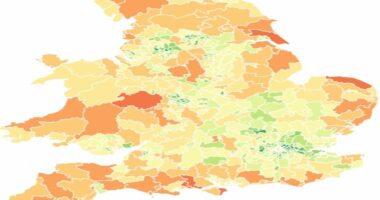Share this @internewscast.com
An estimated one in 31 American children has been diagnosed with autism spectrum disorder, a figure that has been rising for decades.
The rise in diagnoses is largely linked to a reduction in stigma and advancements in screening processes. However, experts warn that symptoms often attributed to autism spectrum disorder (ASD) might actually indicate another condition, obsessive compulsive disorder (OCD).
ASD is known as a neurodevelopmental disorder involving social communication difficulties and recurring, restricted behaviors. In contrast, OCD is an anxiety condition marked by persistent, unwanted thoughts and compulsive, repetitive actions undertaken to mitigate these anxious feelings.
Approximately 3% of children have OCD. Similar to autism, OCD does not have a definitive ‘cure’; however, its symptoms can be controlled. The primary treatment for OCD in children usually involves a particular cognitive-behavioral therapy known as Exposure and Response Prevention (ERP), and sometimes medication may be used.
Physicians have noted that the symptoms of these two disorders often overlap, even though one is primarily neurodevelopmental and the other is anxiety-based.
The two conditions can appear very similar at a glance, often leading to confusion, particularly in young children. Nevertheless, they are fundamentally different when examined more closely.
To an observer, the repetitive behaviors associated with both autism and OCD might look alike. The key distinction lies in the individual’s internal experience. A child with autism might engage in repetitive behaviors to seek order, whereas a child with OCD does so to alleviate compulsive anxiety and intrusive thoughts they find inexplicable.
Dr Rebecca Mannis, a learning specialist with a focus on neuropsychology and how people develop, told the Daily Mail that there is a known overlap between these two disorders. The critical question is whether this is because they are co-occurring conditions, which experts estimate occur in 15 to 20 percent of cases, or because the symptoms of one are being mistaken for those of the other.

Autism and OCD can appear strikingly similar in young children, often leading to misdiagnosis. However, they are fundamentally different conditions, with the former being neurodevelopmental and the latter rooted in anxiety (stock)
Many individuals with autism, particularly those without developmental delays, are not diagnosed until adolescence or adulthood.
This often coincides with the emergence of OCD symptoms, complicating diagnosis. OCD can start at any time, from preschool to adulthood, typically between the ages of seven and 12 or later in life when the person is a young adult.
The average age for an autism diagnosis is five. However, the vast majority of parents notice odd quirks in their children, particularly concerning social skills, as early as two.
In 2000, about 1 in 150 children received an ASD diagnosis.
By 2022, that figure had climbed to 1 in 31, a near-quadrupling that reflects both greater awareness and evolving diagnostic criteria.
Dr Zishan Khan, board-certified child, adolescent and adult psychiatrist with Mindpath Health, told Daily Mail: ‘It’s a matter of getting a proper history, seeing what aspects of their life they find themselves doing these repetitive behaviors and what the motivations behind it are, and that is where you could kind of start to tease out things.’
The critical issue is misdiagnosis, and experts are increasingly concerned that some of the rising autism numbers may be attributable to OCD being mistaken for ASD.
While this is the primary concern driving new research, the reverse is also true; sometimes, autism can be misdiagnosed as OCD, highlighting the complex challenge clinicians face.
![Dr Rebecca Mannis [pictured] described 'just right' OCD, where children become stuck on tasks because things feel slightly incorrect, whether it is handwriting, painting or setting a table](https://i.dailymail.co.uk/1s/2025/10/14/20/102986285-15191471-Dr_Rebecca_Mannis_pictured_-a-35_1760469421319.jpg)
Dr Rebecca Mannis [pictured] described ‘just right’ OCD, where children become stuck on tasks because things feel slightly incorrect, whether it is handwriting, painting or setting a table
Diagnosing OCD and ASD requires extensive fact-gathering by a mental health or child development expert.
The formal criteria for Autism and OCD reveal key differences. Autism is characterized by social communication difficulties alongside repetitive behaviors like strict routines, focused interests, and repetitive movements.
OCD, on the other hand, is defined by the presence of two core features: obsessions, or unwanted, intrusive thoughts that cause intense anxiety, and compulsions, or repetitive behaviors performed to neutralize that anxiety or prevent a feared event.

Dr Zishan Khan explained that a proper diagnosis requires a detailed history to understand the motivation behind the repetitive behaviors, which is key to distinguishing the conditions
This is why experts caution that without a deep understanding of the child’s internal world and background, a compulsion from OCD can be easily mislabeled as a repetitive behavior from autism, and vice versa.
Dr Mannis said: ‘There’s something called “just right OCD,” where a person might feel that the numbers that they’re writing on the page while doing math work, or they may be working on a research paper or or a painting, or even laying things out for some guests, that if they feel that it’s if it’s not “just right,” that it’s hard for them to switch gears, or that something bad may happen.
A child’s OCD can be misdiagnosed as autism because their compulsions may resemble autistic traits like social difficulty and rigid behavior. Without a thorough assessment, the hidden internal struggle of OCD is often overlooked or can easily be mistaken for the core features of autism.
Many children with autism also have OCD, making symptoms difficult to parse.
Past research has highlighted the diagnostic confusion between the two. In a 2017 study, over a third of children with OCD scored high on a standard autism screening tool, showing their symptoms can mirror autistic traits.
Dr Khan said: ‘I personally feel, even though the studies show that anywhere from 17 to 37 percent of individuals with autism may meet the criteria for OCD, I wouldn’t be surprised if it’s higher. It’s just that I see it a lot in my practice.’
An autism diagnosis can obscure OCD, Dr Khan said, because the person has learned to hide their compulsive behaviors in public, even though doing so comes at a high personal cost of internal anxiety.
For clinicians, the ability of older individuals to describe their intrusive thoughts is often the key to diagnosing OCD instead of autism. Dr. Mannis said she often evaluates patients referred for autism by other specialists who suspect a psychiatric origin for their behaviors.
She added: ‘Pediatricians will say, go see Rebecca, because they know something’s wrong. Also, it’s big business, so parents might be going for occupational therapy because of “sensory issues”… but that neuropsychologist may not have done a complete developmental history or might not have gone to observe the child in the classroom, to see the child in action first, to understand well then, is it a matter of autism, or is it OCD?
‘There are checklists that they may use. But a child isn’t a checklist. A child is a living, breathing, wonderful individual, and we need to be looking at developmental history, different situations, and really doing a very careful read.’















